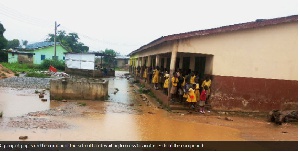It was a cool, breezy morning. The sun, which had given a broad smile in the early hours of the morning, had suddenly been eclipsed by the moody clouds, giving a signal that the floodgates could possibly open.
I had arrived on the premises of St Joseph the Worker Catholic Basic School with a team from the Accra West Region of the Knights and Ladies of Marshall. They were there to donate books to the school and three others.
We all stood in awe of the sight that greeted us on the school premises.
Flood inundated compound
A group of pupils who stood on the corridor of the dilapidated school block watched on as we tried to make our way to the school compound. The entire compound was inundated with water such that stones were placed at vantage points in a linear manner to connect one point of the school to another.
Another group of students was seen weaving their way through in similar manner to a miniature of a pavilion that had been roofed with corrugated iron sheet. The action of the pupils pricked the button of curiosity in me, so I tiptoed to a secure point to feed my eyes with what was going on.
Sanitation challenge
I was utterly dismayed when it dawned on me that the structure was an improvised school canteen. The structure was surrounded with a pile of refuse and flood water. ‘Waooow!’ I exclaimed. But, that was not all. About 20 metres away from the structure was a place of convenience, which was nothing but a death trap.
Like an army of soldiers taking instructions from their commander, some malaria-carrying and merciless mosquitoes began to attack us from all directions. Some members of the team I had travelled with took refuge in their cars and drove to the other side of the compound.
That part of the compound presented yet another spectacle as a herd of cattle grazed and mooed with impunity. There again, frogs and other aquatic insects could be heard croaking and chirping as though they were rehearsing for a music contest.
It was at that point that I realised that the water which had inundated the school premises was not only due to the rainfall a few days ago; but, it was mainly because the land on which the school was situated was a waterlogged and marshy area.
About the school
Located on a wetland at ‘Away,’ Weija, in the Ga South Municipality is the St Joseph the Worker Catholic Basic School, which started in 2004 as a mission school. Administratively, the school falls within the Weija Circuit of the Ghana Education Service (GES). In 2007, it was absorbed by the GES into the public school system.
The school, with a population of 840 pupils and 25 teachers, is a beneficiary of the School Feeding Programme (SFP), but the meals are prepared in the town and brought to the children in the school due to lack of facilities.
The school presented its maiden candidates for the Basic Education Certificate Examination (BECE) in 2014, with the third batch of 73 pupils who wrote the just-ended examination.
The Headmistress of the school, Mrs Monica Obu-Cann, told me the site for the school was an isolated stretch of land reserved for rice farming some decades ago. Two water canals were created to facilitate the flow of water into the wetland. The area had been named ‘Away’ because each time children were sent to sack birds from the rice farms at the time, they shouted “away,” “away,” to scare the birds.
“I cannot give you the exact land size of the school, but the land stretches from that coconut tree to the palm trees over there; and then to that corner.
“The community members have built on the school land, so it is difficult to give the exact land size, but with the description I have just given, I am sure you will be able to estimate for yourself,” Mrs Obu-Cann indicated.
Major challenges
A herd of cattle grazing on the school compound According to Mrs Obu-Cann, the major challenges the school faces have to do with drainage, the indiscriminate dumping of refuse on the school premises by members of the community and the devastating activities of cattle.
“You see, two canals were created to direct water to this land when it was used for rice cultivation. The authorities ought to have redirected the water to a different place, but that has not been done,” she said.
Some of the teachers I interacted with could not hide the ordeal they faced as they narrated how they could not wear short-sleeved shirts to school because of the mosquitoes.
Quality education is a right
Article 25 (5) of the 1992 Constitution of the Republic of Ghana provides for a free compulsory universal basic education for all children in Ghana. This ought to be provided in an equitable and accessible manner. It must include the provision of the right structures and enabling environment for effective learning.
Given the conditions the children of St Joseph the Worker Catholic Basic School and many others in the Weija municipality face, it is clear the future is bleak for them. They are equally at risk of contracting water-borne diseases such as cholera, diarrhoea, and malaria through the mosquito bites.
Way forward
Every attempt must be made by the GES, the Ga South Municipal Assembly and the traditional authorities to create a safe environment for the pupils, by calling owners of cattle and herdsmen to order. It is also important for these bodies to take immediate steps, in collaboration with the appropriate bodies to address the drainage challenge of the school.
If the children of today are indeed the leaders of tomorrow, then the authorities should expedite action to save their souls.
Regional News of Wednesday, 22 June 2016
Source: Timothy Ngnenbe













